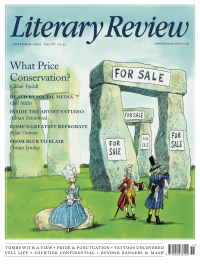Paul Driver
Da Da Da Dah!
The Beloved Vision: Music in the Romantic Age
By Stephen Walsh
Faber & Faber 432pp £25
Although the first part of its title hints at something that’s never quite identified, this wide-ranging survey of musical Romanticism is wonderfully satisfying. Stephen Walsh, who is both a music critic and an academic (the author of, among other studies, a prodigious two-volume biography of Stravinsky), can draw on vast listening experience, and his new book feels like the distillation of a lifetime’s engagement with music. While music in the Romantic age has rarely been treated so thoroughly, wisely and accessibly, Walsh also has a way of stepping back from the subject that allows him to turn the history of one musical period into a history of music altogether.
The narrative sweep stretches from the aftermath of the Baroque and the transitional figure of C P E Bach through the Viennese classicism of Haydn, Mozart and Beethoven to the advent of modernism and even (by way of a farewell dismissive gesture) the rise in the 1970s of a rather watery neo-romanticism. To the non-specialist, it may seem that all the essentials are here, that this is the whole story. Walsh, who designates his book as an ‘armchair read’ – it was written during the pandemic when libraries were out of reach – has triggered a school-time memory of my first encounter with the great composers in Percy Scholes’s The Oxford Companion to Music, a book you did not seem to have to go beyond. Walsh’s has comparable vividness and completeness.
Walsh’s handling of the ‘materialist’ side of musical history – the political backgrounds (frequently turbulent), the development of concert halls, musical societies and instruments – is always accomplished, but his aesthetic appraisals are the most valuable component of the book. Value judgements, so often avoided by academics, are at

Sign Up to our newsletter
Receive free articles, highlights from the archive, news, details of prizes, and much more.@Lit_Review
Follow Literary Review on Twitter
Twitter Feed
Under its longest-serving editor, Graydon Carter, Vanity Fair was that rare thing – a New York society magazine that published serious journalism.
@PeterPeteryork looks at what Carter got right.
Peter York - Deluxe Editions
Peter York: Deluxe Editions - When the Going Was Good: An Editor’s Adventures During the Last Golden Age of Magazines by Graydon Carter
literaryreview.co.uk
Henry James returned to America in 1904 with three objectives: to see his brother William, to deliver a series of lectures on Balzac, and to gather material for a pair of books about modern America.
Peter Rose follows James out west.
Peter Rose - The Restless Analyst
Peter Rose: The Restless Analyst - Henry James Comes Home: Rediscovering America in the Gilded Age by Peter Brooks...
literaryreview.co.uk
Vladimir Putin served his apprenticeship in the KGB toward the end of the Cold War, a period during which Western societies were infiltrated by so-called 'illegals'.
Piers Brendon examines how the culture of Soviet spycraft shaped his thinking.
Piers Brendon - Tinker, Tailor, Sleeper, Troll
Piers Brendon: Tinker, Tailor, Sleeper, Troll - The Illegals: Russia’s Most Audacious Spies and the Plot to Infiltrate the West by Shaun Walker
literaryreview.co.uk